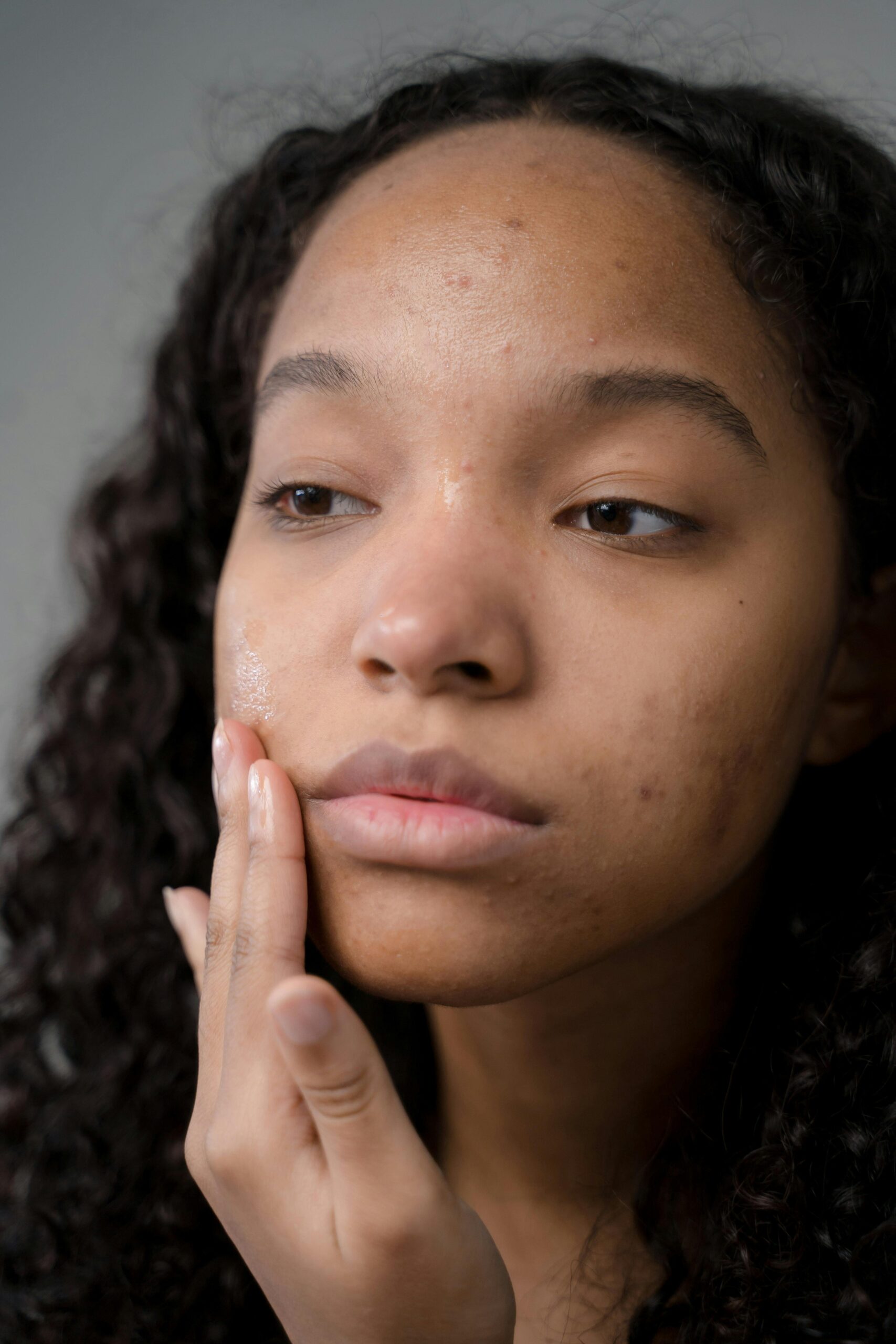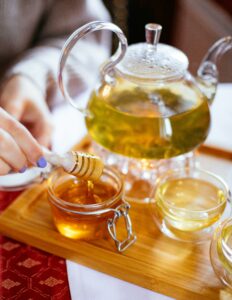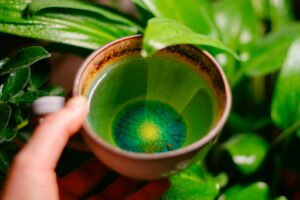Top 10 Natural Remedies For Adult Acne Breakouts

Many people don’t just have to deal with their teenage acne, but adult acne as well. Not only is it extremely frustrating, but it may leave you with emotional and physical scars for life. It can be pretty embarrassing being that one friend that looks like they are still going through puberty. Acne has a particular way of showing up in the best (worst) possible moments. Since breakouts have a lot to do with stress, they most likely will occur right before a first date, on your wedding day, or at your 10-year school reunion if you’re lucky!
Adult acne could be genetic or based on your hormones, but there could a lot more contributing factors. It can be affected by things like hair-styling products, skincare products, makeup, your diet, cell phones, and worst of all, stress. Since adult acne is as common as it is, it’s important to know how to naturally treat it. Most women try 5-10 new products a year.
Using a new product without giving it the right amount of time to work will wreak havoc on your skin. The new preservatives and active ingredients will surely irritate your skin. Therefore, it’s important to learn natural ways to treat and prevent adult acne. Let’s learn more about the benefits of using natural acne remedies!
What Causes Breakouts In Adults?
As I mentioned earlier, adult acne can be caused by a lot of different things which differ from teen acne. Some of those things we can control, but some we cant, like hormones, stress, and pollution. Your acne may be caused by the products you’re using. The products you use should be based on the type of skin you have. If you have oily skin, try to stick with oil-free products. There’s also a possibility that you’re cleaning your face too much. When you see a breakout starting, you may run and scrub your face till it’s red, but you should be gently washing your face only twice a day.
Another major cause of your acne breakouts could be your diet. I know that hearing that the food you love, could be destroying your skin is a tough pill to swallow, but someone had to tell you! Certain types of food are known to cause inflammation in your body as well as your skin.
Foods that spike your insulin levels, like carbohydrates, sugar, or foods high in saturated fats (fried foods, ice cream, and soda) are all possible suspects for causing your acne. I know I just listed some of the best types of foods, but cutting down on these foods would be a great start to living a life of clear skin.
Top 10 Natural Remedies
1. Tea Tree Oil

Tea tree essential oil.
This oil works great to treat acne because it has anti-inflammatory properties allowing it to reduce the redness and swelling of pimples. It is also a natural antibacterial. Researchers have found tea tree oil works similarly to 5% benzoyl peroxide, which is a popular over-the-counter medication for acne. Tea tree oil extract can be applied to your face in creams, gels, or essential oils. Be sure to always dilute them first in a carrier oil, since tea tree oil alone would be way too strong. It’s could also be used as a spot treatment for those random pimples that show up in the worst times possible.
2. Jojoba Oil

Jojoba essential oil.
This oil contains waxy substances that help repair damaged skin, which means it helps speed up the healing process of wounds, even acne lesions. It’s an anti-inflammatory, antibacterial, antiviral, anti-aging, and moisturizing oil. Some of the jojoba oil compounds may be able to reduce skin inflammation, meaning it will make the redness surrounding your acne, decrease. Jojoba oil may be an effective as an acne treatment because it signals skin to balance itself. The best way to treat your acne with jojoba oil is by mixing it with a cream, gel, or clay face mask that you apply to your acne.
3. Aloe Vera

Using aloe vera on your skin helps to keep it moisturized.
Aloe vera contains a lot of water and acts as a terrific moisturizer, making it great for people who suffer from dry skin. The best way to use aloe vera is by first cleaning the acne sores and then apply a thin layer of gel or cream that has at least 10% aloe vera content. You can also use whole aloe vera by itself. It has anti-inflammatory, antibacterial, and antioxidant properties and has been used for centuries to clean wounds, so why wouldn’t it work for acne? One thing that aloe vera can’t do is fade acne scars, but it can help treat acne as it appears.
4. Honey

Putting honey on your skins helps to clear pores.
Honey goes way back as being used for skin treatment. This is because it contains a lot of antioxidants that help clear dirt from clogged pores. Many doctors use honey to dress wounds because of its wound-healing properties. If you are going to use honey to treat your acne, you should stick (ha, get it?) with raw honey. Anything that’s processed won’t have the antibacterial effect. When honey is processed, the antibacterial and anti-inflammatory properties are destroyed. You can rub a little honey onto your pimples or add it to a face or body mask.
5. Garlic
Many practitioners use garlic to treat infections and boost the body’s ability to fight germs and infections. Garlic has been used medicinally for centuries. It is a powerful antioxidant that has anti-inflammatory and antimicrobial properties. Garlic can be used to reduce acne because acne is caused by the over-accumulation of clogged pores, toxins, and bacterial infections. The best way to work garlic into your skincare regime is by eating more of it! Garlic works well when mixed with aloe vera or honey as a spot treatment. The garlic juice can be used as it or heated. You can also use dehydrated garlic powder and aged garlic extract.
6. Green Tea

Drinking green tea helps to reduce redness on skin.
Green Tea is rich in a group of polyphenol antioxidants called catechins. It may also contain ingredients with the ability to reduce the skins sebum production, P. acnes, and inflammation. If you’re wondering what P. acnes stands for, it’s Propionibacterium acnes- a bacteria that plays a very important role in acne breakouts. Green tea can help your acne by either drinking it or dabbing it on your face. Drinking green tea can make your skin produce less sebum, boost your immune system, and reduce your inflammation levels. It’s a win-win all around.
7. Rosemary
The extract from rosemary contains compounds and chemicals that have anti-inflammatory, antibacterial, and antioxidant properties. When using rosemary oil for your skin, be sure to dilute it in a carrier oil. You can then massage it into your skin. It will help the saggy skin by pulling your skin cells together. It also could reduce marks or scars when combined with vitamin E. When using it for acne, you don’t need to dilute it (unless it stings or feels too strong). You can use a cotton swab to apply it to the pimples on your face.
8. Coconut Oil

Coconut oil.
To most, applying coconut oil to your skin may sound counterproductive. Many think it will cause breakouts instead of treating them. But, you know what’s worse than having acne? Acne and dry skin. If you’re trying to dry out your skin and strip it of everything its got, you’re doing something wrong. Coconut oil has antibacterial and antifungal properties that can truly benefit our skin. It’s also easily absorbed by our skin since it mostly consists of short and medium chain fatty acids. Whenever you feel like your skin needs some coconut oil, take a very, very small amount and rub it into your face. A little goes a long way.
9. Apple Cider Vinegar
Vinegar is known for its ability to kill a lot of different types of viruses and bacteria. It contains acetic, lactic, citric, and succinic acid, which has been shown to destroy P. acnes. It may also be able to improve the appearance of scars because of its organic acids. Applying organic acids to your skin is commonly referred to as “chemical peeling.” The acids remove the outer layers of the skin that are damaged to promote regeneration. Apple cider vinegar can possibly help your acne when mixed with water, but you shouldn’t use it if your skin is sensitive or open wounds since it could burn you if left on your skin for too long.
10. Mint
Mint helps to refresh your skin and clean pores.
Since mint leaves have anti-bacterial properties and menthol, it can help in caring for your skin and may even be able to treat acne. It also contains salicylic acid, which is a common ingredient found in over the counter acne medication. You can use mint leaves to make a paste, you just need to add water to ground mint leaves. When you feel like it’s the perfect paste consistency, apply it to the affected area. After it dries you can rinse it off. You’re not one step closer to clearer skin.
Conclusion
In summary, acne sucks the literal and physical life out of us. It becomes such an annoyance. The second you think you’re having a good skin day, a ripe zit will suddenly appear. You could be doing everything right for your skin, but still be suffering because of hormones or something that you can never get control of- genetics. Dirt and oil will always find a way into our pores, it’s our 24/7 job to make sure it doesn’t cause something ugly and long-lasting. Natural remedies are a great way to treat acne early on to avoid acne scars as well as emotional ones.
Remember that everyone deals with acne in some sort of way. Unfortunately, many may even find it debilitating. Some people quit their jobs or stop hanging out with friends because of their acne. The fact that everyone in magazines and on TV has perfectly smooth, over photoshopped skin doesn’t help either. And for those select few that aren’t dealing with acne, well they’ve got their own set of problems, you wouldn’t want. Using these natural remedies to reduce your acne breakouts will not only increase your confidence levels, but it may also decrease your stress levels- leading you to live a better, more tranquil life.


